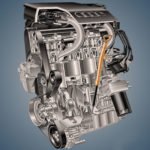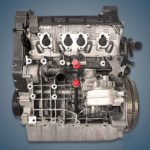The 1.9-liter diesel engine VW AHF 1.9 TDI was produced by the company from 1997 to 2000 and was installed on such popular models of the German concern as Bora, Golf 4 and Audi A3 8L. In 2000, this engine gave way to a similar ASV diesel engine with EURO 3 support.
The EA180 series also includes: 1Z, AFN, AHF, AHU, ALH, AVG, AKU, AEY.
Specifications
| Production years | 1997-2000 |
| Displacement, cc | 1896 |
| Fuel system | direct injection |
| Power output, hp | 110 |
| Torque output, Nm | 235 |
| Cylinder block | cast iron R4 |
| Block head | aluminum 8v |
| Cylinder bore, mm | 79.5 |
| Piston stroke, mm | 95.5 |
| Compression ratio | 19.5 |
| Features | SOHC, intercooler |
| Hydraulic lifters | yes |
| Timing drive | belt |
| Phase regulator | no |
| Turbocharging | VGT |
| Recommended engine oil | 5W-40 |
| Engine oil capacity, liter | 4.3 |
| Fuel type | diesel |
| Euro standards | EURO 2 |
| Fuel consumption, L/100 km (for Volkswagen Golf 1998) — city — highway — combined |
6.7 4.2 5.0 |
| Engine lifespan, km | ~400 000 |
| Weight, kg | 150 (with attachments) |
The engine was installed on:
- Audi A3 1 (8L) in 1997 – 2000;
- Skoda Octavia 1 (1U) in 1997 – 2000;
- Seat Leon 1 (1M) in 1999 – 2000;
- Seat Toledo 2 (1M) in 1998 – 2000;
- Volkswagen Bora 1 (1J) in 1998 – 2000;
- Volkswagen Golf 4 (1J) in 1997 – 2000.
Disadvantages of the VW AHF engine
- The cause of thrust failures is often in the wedge geometry of the turbine or the damper in the EGR valve;
- Also, at high mileage, valve seats often burn out and compression drops;
- A broken ribbed belt here may end up getting it into the timing and overhaul;
- If your entire sump is in oil, then start looking for leaks from the lower flange of the crankcase ventilation tube;
- The source of the antifreeze leak here is usually a cracked cooling tee.






